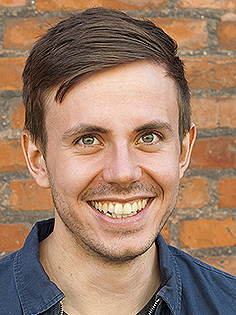Valentin Waschulin
 Doctoral Researcher,
Doctoral Researcher,
email: Valentin.Waschulin@warwick.ac.uk
Affiliation:
School of Life Sciences
University of Warwick
Education and Experience
I have always been fascinated with nature, both in the big and the small. As I child, I spent a significant part of my time in the forest, looking for and catching anything from earthworms (easy) to frogs (hard), snails (very easy) and dragonflies (never actually managed). At five years old, I started my first cultivation experiments by sticking beans into flower pots around the house. And before I knew it, I was studying biology at the University of Vienna.
During my bachelor studies in Vienna, with an ERASMUS stint in Paris, I was astounded to learn how biological processes at micro- and nanometre scale can beget large and even global effects. I was also intrigued by the different ways in which humans have harnessed the power of microbes for the benefit and pleasure of humanity. Little by little, I was convinced that biology has a vast potential to change lives and get our economy on a path towards environmental sustainability. And I could see myself playing a part in that.
With the determination to make a change in the world through biology, I decided to study biotechnology at the University of Copenhagen, Denmark. My master’s thesis was done in collaboration with the biotechnology company Novozymes. In the course of a year, I developed and optimised a novel enzymatic paper pulp bleaching technology and studied enzyme effects on different model compounds using LC-MS and GC-MS. During this time, I experienced my first highs and the lows of the scientific experience, and came out with a paper in the end.
I then decided to pursue a PhD and got accepted for my current position within the Marie Curie ITN CARTNET, working on finding novel antibiotics from soil ecosystems. Besides my specific PhD research, I am also very interested in the emerging field of cellular agriculture and have co-authored a whitepaper published by the Good Food Institute.
ESR6: Novel Antibiotics from Extreme Environments
Project description:
With drug resistant pathogens threatening to reinstate infectious diseases as humanity’s number one killer and antibiotic development pipelines drying up, there is a need to look for new compounds in places we haven’t looked before, using methods we haven’t used before, to find natural products that haven’t been found before.
I aim to exploit the potential of difficult to cultivate and therefore underexplored and underestimated microbial phyla for secondary metabolite production. Working with soil from extreme environments, I am using both cultivation-dependent and cultivation-independent approaches to explore their biosynthetic potential. Using long read (Oxford Nanopore) and short read (Illumina) sequencing to discover biosynthetic gene clusters from genomes and metagenomes, I then employ different cloning techniques to express novel biosynthetic gene clusters in different microbial hosts. This is followed by analytical chemistry and activity testing to ascertain structure and biological activities of the discovered compounds. My project includes two secondments: One at the drug discovery company NAICONS in Milan and one at the University of Copenhagen.
Other CARTNET Fellows
- ESR 1: Marco Albanese
- ESR 2: Anmol Adhav
- ESR 3: Vitalii Solomin
- ESR 4: Blanca María Fernández Ciruelos
- ESR 5: Kristiina Vind
- ESR 6: Valentin Waschulin
- ESR 7: Isabela Fernandes de Oliveira
- ESR 8: Yong Kai Ng (Duncan)
- ESR 9: Anaëlle Fait
- ESR 10: Frida Svanberg Frisinger
- ESR 11: Patricia Espenhain Sørensen
- ESR 12: Helena Leinweber
- ESR 13: Emilia Wedel
